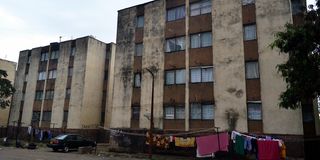
Residential houses in Nairobi's Woodley Estate.
The battle between City Hall and tenants of its old estates earmarked for redevelopment could turn ugly after the county government threatened rent defaulters with evictions.
Plans by Governor Johnson Sakaja’s administration to rebuild some 13 old estates without proper public participation and consensus from the tenants has triggered conflict.
Documents seen by the Nation reveal some tenants have not paid rent for 13 years despite repeated notices and eviction warnings.
With Woodley Estate being the worst affected, the document showed that some 13 tenants owe the county over Sh1 million each, with non-payment periods ranging between 65 and 158 months. Monthly rents for these tenants range from Sh11,000 to Sh17,600.
For instance, a tenant of the estate has not paid his rent for 158 months, equivalent to 13 years. The tenant, who pays a monthly rent of Sh17,600, now owes the county Sh1.8 million in unpaid rent.
In another case, a tenant who pays Sh11,000 a month, has not paid rent for 102 months, or eight and a half years, translating to arrears of Sh1.74 million.
In total, 118 tenants in the estate owe City Hall a staggering Sh39.63 million in unpaid rent.
Essential services
Appearing before the Senate Roads and Housing committee on Monday, Governor Sakaja warned of looming evictions, questioning how his administration is expected to deliver essential services when tenants refuse to honour rent obligations.
He said his administration has been lenient with the defaulters and has not taken drastic measures like locking the tenants out of their houses as is done in some low-income areas like Mathare.

Nairobi City County Government-owned Kariobangi South flats with their peeling coats of paint.
“For everyone in our county houses who is not paying rent, you will be evicted. That is what will happen. These houses don’t belong to me. They belong to the people of Nairobi,” said Governor Sakaja.
The county chief decried the widespread rent defaulting, noting that some tenants pay significantly below market rates but still fail to honour their obligations.
He gave an example of Woodley Estate where he said a house sits on half an acre with a splash compound. Nairobi County has about 17,000 public housing units, many located in prime areas.
“If you fail to pay Sh10,000 or Sh17,000 for such a property in an area where the minimum market rent is Sh150,000, then what should we do with you?” posed the governor.
He told the committee chaired by Migori Senator Eddy Oketch that the redevelopment programme will continue despite resistance from some residents and their associations.
But the estates’ officials hit back at the governor, accusing his administration of failing to conduct public participation on the acquisition of the land for the project.
The officials told the committee that the issue of ownership of the land has not been concluded and there was no reason for City Hall to enter into a joint venture to construct the modern housing units.
The project, aimed at transforming the old houses into high-rise units, is being implemented through joint ventures with private developers.
According to Mr Agesa Omega, representing Lumumba Residents Association, the issue of the ownership of the land for the ongoing programme must be settled first before any engagement can be done.
He claimed that City Hall published an expression of interest for the offtake of the project in January 2021 but only reached out to the residents six months later.
Meaningful dialogue
“We feel that this meeting was just to rubber stamp what they had already decided to undertake. We did not accept the regeneration project,” said Mr Omega.
The residents maintain that the land issue has not been conclusive and City Hall has been evasive, lacking courtesy and not creating a conducive atmosphere for meaningful dialogue.
“The project being implemented in Maringo was not approved by the County Assembly. This to us in itself is a breach of the law. Public participation has also not been conducted. We have also written to the governor and he has not had the courtesy to respond to us,” said Maringo Estate Resident Association Secretary Mr Onyango Ogutu.
For his part, Woodley Residents Welfare Society chairperson Sam Gachago opposed the threats to forcefully evict some tenants without proper engagement with the county government.

Nairobi County Estates Chairman Sam Gachago at his house in Woodley Estate, Nairobi on August 24, 2024.
He told the committee that City Hall has only compensated some residents Sh900,000 for relocation allowance.
Mr Gachago said that the many rent defaulters in the estate stems from belief by some of them that they own the houses and therefore did not have to pay rent, resulting in the accumulations.
“There was a gazette notice during the administration of Governor Mike Sonko that gave the residents a waiver and that the residents should start paying rents in 2019. No one has refused to pay rent,” said Mr Gachago.
The programme is already underway in Woodley Estate with the first phase involving the construction of more than 1,900 housing units, up from the current 44.
Other estates slated for redevelopment include Maringo, Pumwani, Ofafa Jericho, Lumumba, Kariobangi North, and Kariobangi South.
Governor Sakaja has maintained that his administration, and previous ones, including the now-defunct Nairobi Metropolitan Services, had engaged residents extensively.
He added that his administration has also offered humane terms: relocation support, rental assistance, and allotment letters guaranteeing a free unit upon project completion.
“At what point does public participation stop and the government acts? If you wait for 100 percent agreement on any project, nothing will ever be done,” he said.
He accused some association leaders of deliberately blocking engagement between the county and residents.





